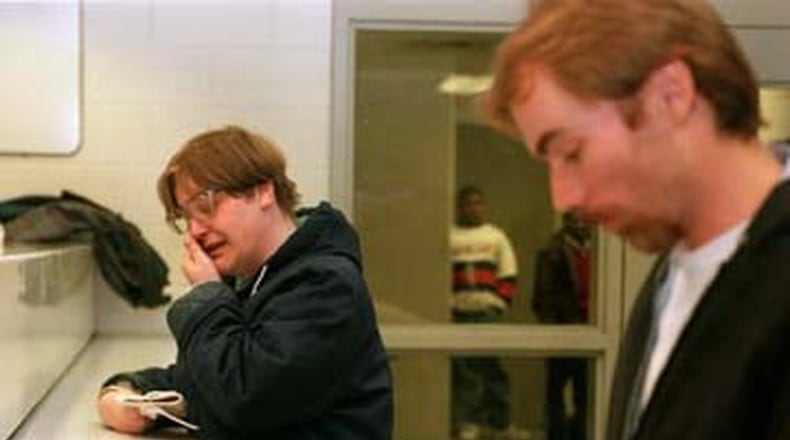Wilcox and Aldridge appealed their convictions and had them overturned in March 1996 — after spending 11 years in prison. The highly sensational case fell apart after it was determined that key information was withheld at trial, testimony was coerced and the state was aware of the possibility that its child witnesses were committing perjury. Three witnesses later recanted as adults.
Columbus-based private investigator Martin Yant, who works on wrongful conviction cases, worked on the Wilcox and Aldridge case and found sloppy work, hysteria and unjustified arrests. His findings were key to winning their release from prison.
RELATED: List of wrongful convictions growing in Ohio
Despite their convictions being thrown out 24 years ago, Wilcox and Aldridge had to wait until now to win damages from the state for wrongful imprisonment. A change in state law that took effect in March 2019 expanded the ways someone can prove that they were wrongfully convicted to include "Brady violations" — when the police or prosecutors withhold exculpatory information from the defense.
The missing documents included police reports listing up to 30 child victims and seven other adult suspects, handwritten witness statements, and medical evidence showing no sign of abuse of children ages 8 and younger.
Wilcox and Aldridge were declared wrongfully convicted by Montgomery County Common Pleas Court Judge Mary Wiseman in May 2020.
Ohio Public Defender Tim Young, who defended Wilcox and Aldridge at trial and the post-conviction hearing, called it “the case of a lifetime” that drew local and national media coverage.
Young said the case included bizarre events such as two brothers being taken to juvenile detention and told they wouldn’t be released until they told the truth, and a mob of parents trying to attack another man who was suspected of participating in the alleged abuse at the apartment complex.
“Really a travesty and such an abuse of power — the whole apartment complex was in a years long uproar because the police and prosecutors decided something happened and did not quit until two innocent people were in jail and children’s lives and memories were forever altered,” Young recalled.
Wilcox and Aldridge each live in Indiana — she in a small town near Bloomington and he in Columbus. Though the two parted ways long ago, they each wish each other well.
The case profoundly affected both of their lives.
Wilcox, now nearly 60 and suffering health issues, was a young mother of two and a college student studying to be a special education teacher when she was arrested and wrongfully imprisoned. Her incarceration pulled her away from her son and daughter and it took years to rebuild their family relationships and finish college, she said.
She carried the stigma of the case for decades and pushed herself to work 80 hours a week, said Wilcox, who is a case manager for intellectually disabled adults.
“It has been hard. Being called a child molester isn’t an easy thing, and even after your name is cleared, you still have a stigma. And so many things that happened in prison really crushed my self-esteem, like the way they made you strip search before you went out to see your children,” Wilcox said.
“It’s been a tough way but I’m proud that I have done it,” she said.
Wilcox said she never had a run-in with the law before or after this case. “That’s just who I am,” she said. “I don’t even jaywalk.”
Aldridge, now 56, said he was released from prison on a winter night with an inmate uniform, a toothbrush and no coat, and the stigma of being called a child molester.
He is now a homeowner, father of four and grandfather of nine who has worked at the same auto supplier factory for 24 years.
“I’m not a one-eyed monster or animal to be locked up and disregarded. So that stigma is definitely behind me,” he said.
Aldridge said he would like to see more checks and balances in how police investigations are conducted so that wrongful convictions can be avoided. Wilcox said police misconduct needs to be addressed.
“The scary part of it is that it can happen to anybody else and it can happen still yet today,” he said. Aldridge added: “There were no real winners in my case. Everybody was truly a victim. Until there is change at the root, it’ll continue. It could happen again tomorrow.”
CASE CHRONOLOGY
1985: Jennifer Wilcox and Robert Aldridge, then ages 23 and 20, are charged with multiple counts of rape and gross sexual imposition involving four children younger than 13. Six children from their Huber Heights apartment complex testify against the pair, alleging bizarre sex acts and nude photos. A jury convicts the pair on the strength of the youths' testimony. The defendants receive multiple life sentences.
1986: An appeal by Aldridge fails. Aldridge questioned the children's competency to testify. But appellate judges said the youths passed competency tests.
1994: After three of the six witnesses signed sworn statements recanting the testimony they gave as children, Wilcox's lawyers ask that her conviction be set aside.
1995: Aldridge's lawyers join Wilcox's appeal.
1996: Their convictions are voided by visiting Judge Richard E. Parrott, who determined the couple did not receive a fair trial. They are released from prison.
2000: Aldridge and Wilcox unsuccessfully sued the state for wrongful imprisonment.
2019: A change in state law expands the grounds for which citizens may sue for wrongful imprisonment and some claims are eligible for reconsideration.
2020: Aldridge and Wilcox are declared wrongfully convicted. The state agrees to pay $527,255 to Aldridge and $726,315 to Wilcox. The state also will pay $646,430 to Cooper & Elliott, the firm that represented the two.
About the Author

